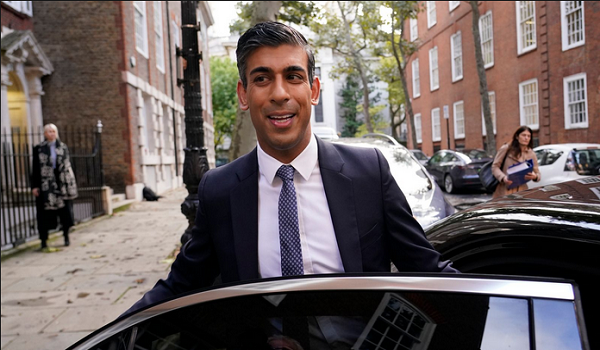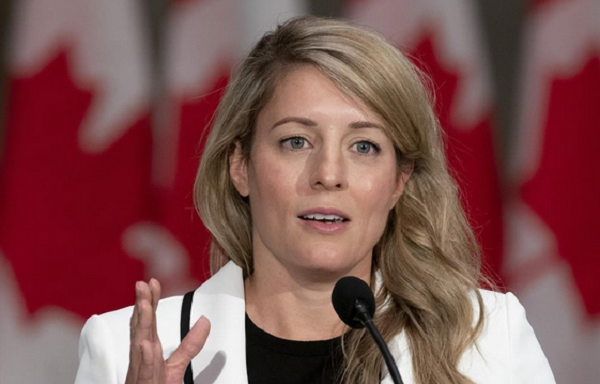U.K. to begin sending asylum seekers to Rwanda
British Prime Minister Rishi Sunak has finally managed to win parliamentary approval for his controversial plan to send some asylum seekers to Rwanda, but the measure could still be derailed by a wave of lawsuits.
Mr. Sunak has been grappling for months over how to stop small boat crossings from France and he has repeatedly promised to begin deporting migrants to Rwanda this spring. But his efforts so far have been blocked by legal challenges and the House of Lords, which refused to consent to a bill that would enact the plan.
The parliamentary standoff finally ended early Tuesday morning when the Lords relented, clearing the way for the bill to become law later this week.
“The passing of this landmark legislation is not just a step forward but a fundamental change in the global equation on migration,” Mr. Sunak said on Tuesday. “Our focus is to now get flights off the ground, and I am clear that nothing will stand in our way of doing that and saving lives.”
It’s still far from certain when, or if, the first migrants will be sent to Rwanda where their refugee claims would be adjudicated. Mr. Sunak said on Monday that it will take up to three months for the program to be fully operational. Several charities that work with refugees have also signalled that they will challenge the law in court, which could include an application to the European Court of Human Rights.
“This shameful bill trashes the constitution and international law whilst putting torture survivors and other refugees at risk of an unsafe future in Rwanda,” said a joint statement from Amnesty International, Freedom from Torture, and Liberty.
A group of UN experts has also warned airlines about participating in the scheme. “If airlines and aviation authorities give effect to state decisions that violate human rights, they must be held responsible for their conduct,” said three UN Special Rapporteurs who work on issues related to human trafficking, human rights and torture.
Mr. Sunak has made stopping the boats a flagship commitment of the government and he has been undeterred by critics. “We introduced the Rwanda Bill to deter vulnerable migrants from making perilous crossings and break the business model of the criminal gangs who exploit them,” he said during a news conference on Monday. “The passing of this legislation will allow us to do that and make it very clear that if you come here illegally, you will not be able to stay.”
The British government has been trying for years without success to stem the flow of asylum seekers across the English Channel.
Last year more than 29,000 migrants from Syria, Afghanistan, Iraq and other Middle Eastern countries made the perilous journey and the annual figure has more than tripled since 2020, according to figures from the Home Office. So far this year more than 5,000 people have crossed the Channel, a 43 per cent increase from the same period in 2023.
Charities have said that close to 400 people have drowned in the last few years and many more have been rescued by coast guard officials from Britain and France.
Britain struck a refugee agreement with Rwanda in 2022 in the hope of deporting thousands of undocumented migrants to the African country where their refugee claims would be processed. The British government has agreed to cover the costs of running the program, which have soared to around £370-million, or $626-million, even though no migrants have been deported because the deal has been bogged down in legal challenges.
Last fall a five-judge panel of the British Supreme Court unanimously found that the treaty was unlawful because Rwanda could not be considered a safe country.
In response to the ruling, Mr. Sunak introduced the Rwanda Bill, which he said would address the court’s concerns.
The Prime Minister has argued that the treaty and the legislation were designed to help Rwanda improve its refugee adjudication processes and ensure that Rwandan authorities do not deport unsuccessful claimants to another country. The legislation also says that “in the judgment of the U.K. parliament, the Republic of Rwanda is a safe country.” And it overrides some human rights laws in order to limit the ability of asylum seekers to challenge their removal in British courts.
Mr. Sunak has been hoping that by addressing the small boat crossings he will bolster the Conservative Party’s fortunes in the upcoming general election expected this fall. The Tories trail far behind the Labour Party in opinion polls, but Mr. Sunak sees immigration as a dividing line with Labour, which has vowed to scrap the Rwanda plan.
Labour MP Yvette Cooper, who is the party’s Home Office critic, has said the Rwanda program was a waste of money and that a Labour government would spend the money on increased border security and clearing the backlog of asylum applications.
This article was first reported by The Globe and Mail












